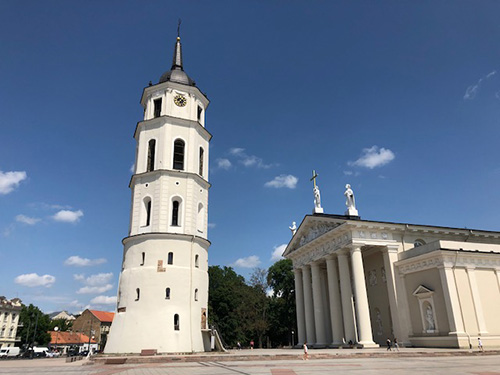Immunotherapy for NSCLC – First line treatment
Εισήγηση της Δρ. Σοφίας Μπάκα σε ογκολογικό συνέδριο στο Βίλνιους, πρωτεύουσα της Λιθουανίας, με θέμα «Immunotherapy for NSCLC – First line treatment». Η εισήγηση:
«In the past 2 years three programmed death-1 (PD-1) and PD ligand 1 (PD-L1) checkpoint inhibitors-nivolumab, pembrolizumab and atezolizumab have received FDA approval for second line treatment, of advanced NSCLC. Immune checkpoint inhibitors have significantly modified the therapeutic landscape of advanced non-small cell lung cancer in second-line settings, but there is also advancement in first-line setting.
In October 2016, pembrolizumab was approved in the first-line setting, for patients with NSCLC who have more than 50% PD-L1 expression. Approval in the first-line setting was based on the Keynote-024 trial, which showed very positive data for pembrolizumab as compared with platinum-based doublet chemotherapy in patients with NSCLC. The response rate was 45% with pembrolizumab vs 28% with chemotherapy. PFS was 10 months with pembrolizumab vs 6 months with chemotherapy. Overall survival was also significantly improved with pembrolizumab vs chemotherapy. The Keynote-024 trial set the bar for first-line immunotherapy in non–small cell lung cancer. PD-L1 status should now be considered a new biomarker to guide first-line treatment in patients with advanced non-small cell lung cancer.
In CheckMate 026, comparing first-line nivolumab with platinum doublet chemotherapy in PD-L1-positive (≥1%) patients, nivolumab did not improve PFS or OS in the prespecified subgroup of patients with 5% or higher PD-L1 positivity. This finding suggests that single-agent checkpoint inhibitors might not be sufficiently active to use upfront in low PD-L1 expressors, and that combination regimens, might be needed to augment response.
In CheckMate 026, comparing first-line nivolumab with platinum doublet chemotherapy in PD-L1-positive (≥1%) patients, nivolumab did not improve PFS or OS in the prespecified subgroup of patients with 5% or higher PD-L1 positivity. This finding suggests that single-agent checkpoint inhibitors might not be sufficiently active to use upfront in low PD-L1 expressors, and that combination regimens, might be needed to augment response.
The CheckMate 012, phase I trial tested the combination of nivolumab and ipilimumab. Progression-free survival was 3.6 months with nivolumab monotherapy and 8.0 months with nivolumab/ipilimumab combination therapy among 129 patients unselected with respect to PD-L1 expression.
In the Keynote-021 trial (a phase II), Pembrolizumab was added to the chemotherapy doublet of carboplatin plus pemetrexed and compared with chemotherapy. The addition of pembrolizumab improved PFS by 13 vs 8.9 months, but also added to toxicity.
Immune checkpoint inhibitors are the standard of care for second-line treatment in advanced NSCLC, and pembrolizumab should be considered a standard first-line treatment in NSCLC patients with a good performance status whose tumors have PD-L1 expression ≥ 50%. Whether immunotherapy combination with chemotherapy is better than immunotherapy alone or the combination of different checkpoint inhibitors remains unknown since no phase III trial data is yet available. The development of other biomarkers in addition to PD-L1 might help for the right treatment choice».

